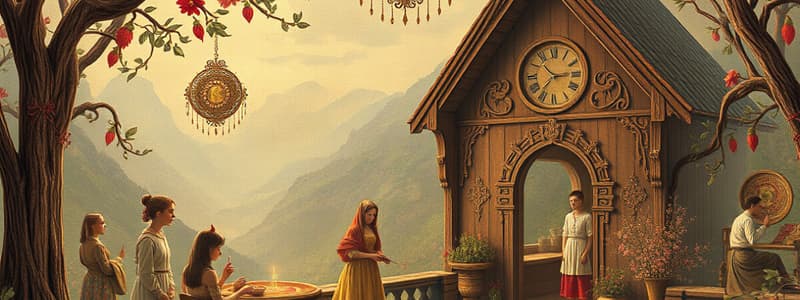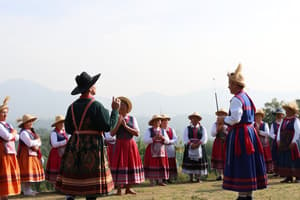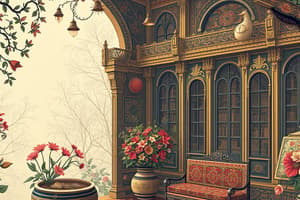Podcast
Questions and Answers
Folk culture is characterized by its rapid change and adaptation over time.
Folk culture is characterized by its rapid change and adaptation over time.
False (B)
The term folk can be traced back to Old Norse, English, and Germanic origins, referring to clans or groups of people.
The term folk can be traced back to Old Norse, English, and Germanic origins, referring to clans or groups of people.
True (A)
Folk customs are primarily transmitted through modern technology and digital communication.
Folk customs are primarily transmitted through modern technology and digital communication.
False (B)
Folk cultures tend to cultivate a limited variety of crops due to the danger associated with relying on only a few food sources.
Folk cultures tend to cultivate a limited variety of crops due to the danger associated with relying on only a few food sources.
Houses within a folk culture are often diverse in design due to a preference for experimentation.
Houses within a folk culture are often diverse in design due to a preference for experimentation.
The concept of cultural lag refers to the immediate adoption of new innovations across all cultures.
The concept of cultural lag refers to the immediate adoption of new innovations across all cultures.
Commodification involves transforming cultural attributes into mass-market products, often altering their original characteristics.
Commodification involves transforming cultural attributes into mass-market products, often altering their original characteristics.
The German Grimm Brothers were active in the 19th Century and sought to suppress folk culture.
The German Grimm Brothers were active in the 19th Century and sought to suppress folk culture.
Globalization allows for the frictionless movement of people, ideas, and money, fostering global culture.
Globalization allows for the frictionless movement of people, ideas, and money, fostering global culture.
Popular culture is primarily sustained through substantial government support and minimal marketing efforts.
Popular culture is primarily sustained through substantial government support and minimal marketing efforts.
The decline of folk culture is closely linked to the shrinking of small, rural communities since the Industrial revolution.
The decline of folk culture is closely linked to the shrinking of small, rural communities since the Industrial revolution.
Hierarchical diffusion in popular culture means that innovations spread equally across all regions at the same time.
Hierarchical diffusion in popular culture means that innovations spread equally across all regions at the same time.
Popular culture is characterized by its local and unique production methods that build community relationships.
Popular culture is characterized by its local and unique production methods that build community relationships.
Companies like Taco Bell focus on authenticity to ensure their products are representative of traditional Mexican cuisine.
Companies like Taco Bell focus on authenticity to ensure their products are representative of traditional Mexican cuisine.
Mardi Gras maintains its cultural relevance by strictly adhering to traditional customs without any modern influences.
Mardi Gras maintains its cultural relevance by strictly adhering to traditional customs without any modern influences.
Flashcards are hidden until you start studying
Study Notes
Folk Culture
- Folk culture evokes traditional costumes, dances, and music, often seen in festivals and museums.
- The term "folk" derives from Old Norse/English/Germanic, originally describing an army or clan, emphasizing shared identity.
- Rooted in specific geographic locations, folk cultures are found in small, homogeneous groups.
- Stable over time but variable across different regions, folk customs evolve slowly, originating in the past.
- Knowledge and cultural practices are transmitted through person-to-person interaction, emphasizing hands-on learning.
- Resource utilization is based on local availability, impacting architecture, culinary practices, and medicinal systems.
- Folk entertainment often reinforces cultural beliefs, with music and folktales serving as essential aspects of community identity.
- Holidays provide communal entertainment and opportunities to challenge social norms, such as Mardi Gras.
- Intoxicants play a role in folk culture, traditionally used in rituals, yet often commercialized in modern contexts.
- The revival of interest in folk culture has been driven by movements like Slow Food and cultural tourism.
- Historical preservation of folk culture is exemplified by figures like the Grimm Brothers and John Lomax, who sought to document fading traditions.
- Handcrafted goods differ significantly from industrial products, highlighting the deep knowledge embedded in folk craftsmanship.
Changing Cultural Landscape
- The decline of folk culture is influenced by the rise of popular culture and changing political landscapes.
- Nationalistic policies have marginalized minority cultures, fostering a uniform national culture through education and language.
- Economic shifts since the Industrial Revolution have led to shrinking rural communities, disrupting the reproduction of folk cultures.
- Migration to urban areas practicing popular culture intensifies pressures to assimilate, compromising folk traditions.
- Enhanced infrastructure and technology, such as the Internet, accelerates the diffusion of popular culture, widening cultural exchange.
- The U.S. serves as a cultural melting pot, with diverse folk cultures influencing the broader culture due to immigration.
Popular Culture
- Popular culture primarily focuses on commercial consumption, impacting local production of food, clothing, and housing.
- Driven by marketing, industries continually reinvent trends to ensure products remain appealing to consumers.
- Fashion influences various markets beyond clothing, affecting automobiles, fast food, and holiday commercialization, particularly in Western contexts.
- Hierarchical diffusion sees new cultural trends originating in major cities, later reaching smaller communities, leading to cultural lag.
- Popular culture is characterized as stable over geographic space but variable over time due to constant marketing changes.
- Commodification alters folk customs, exemplified by global fast-food chains serving modified cultural products.
- International corporations dominate cultural content, accounting for a significant share of global sales in music and entertainment.
Interface Between Local and Global
- Globalization intertwines local and global cultures, with commerce driving product survival in the marketplace.
- Commodification transforms cultural attributes into mass-market products that may differ substantially from their origins.
- Global brands often adapt their offerings to local needs while prioritizing profit over authenticity, reshaping cultural landscapes.
Global Culture
- Globalization creates a homogeneous global culture, blurring local distinctions and integrating diverse cultural elements.
- Media products, such as video games and movies, aim for international appeal, facilitating the merging of national popular cultures.
- Transnational corporations dominate cultural distribution channels, significantly influencing local practices and consumer preferences.
- Disparities in access to technology showcase the uneven distribution of globalization's benefits.
Resistance to Popular Culture
- Growing opposition to popular culture manifests from concerns over corporate influence, secularization, and loss of regional identity.
- Resistance is expressed through movements advocating for local customs, such as farm-to-table initiatives and the Slow Food movement.
- Anti-globalist sentiments emerge from both political spectrums, emphasizing the need to preserve local autonomy and cultural heritage.
- Nostalgic views of a "golden age" can drive backlash against perceived cultural erosion by modern popular influences.
- Cultivating locally sourced food challenges the dominance of global fast-food entities, highlighting a broader movement towards cultural preservation.
Studying That Suits You
Use AI to generate personalized quizzes and flashcards to suit your learning preferences.




